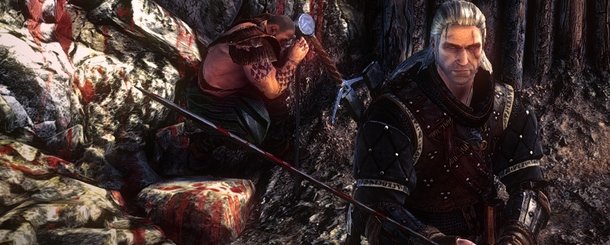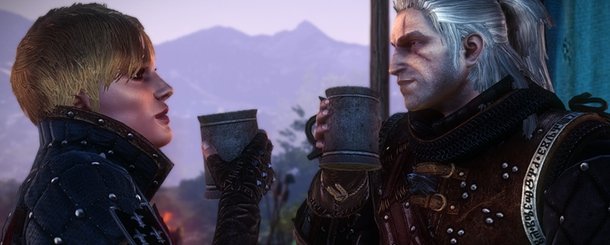Interview: CD Projekt's CEO on Witcher 2 piracy, why DRM's still not worth it

PCG: Do you pay attention to unique approaches to copy protection? For instance, Bohemia Interactive's FADE/DEGRADE tech turned a few heads recently by slowly making pirated copies of Take on Helicopters unplayable. Are there any techniques along those lines - in other words, ones that don't harm legitimate customers - that you've considered implementing?
MI : I was reading about what Bohemia did and it's not a bad thing, but ultimately it will be cracked. The question is how much time it will give, and being a developer you always have to ask yourself the question if this kind of protection will not harm even a small percentage of your legal customers.
I would rather focus on rewarding the legal customers. We did this with Witcher 2 and beefed up both the retail and digital version with a lot of additional goodies to make it real value for money. I always think that ultimately it's about convincing the customer in all possible ways, that your game is the best value and that the original version is something they must have at home. I do not believe in forcing anyone to buy our game. If they do not want it and they pirated it, it means we did not have the right offer for them – maybe the price was too high and they will buy it later on a year or two after the release when it will be more affordable.
PCG: What about always online "games as a service" platforms, ala Blizzard's Diablo III and its Auction House? Do you think those fall under the umbrella of "punishing legitimate customers for hackers/cheaters/pirates' crimes"?
MI : So long as it's a real part of the game it's the best thing you can do. Blizzard was the first to come up with it, and they sold gazillions of copies of Diablo 2 just because you had to have the legal copy to be part of Battle.net. That's a fair deal, and it works. I would love to have something like this in The Witcher, and I hope the time will come. However, it must offer real value and enhance the gameplay experience. Gamers are not tricked easily and either it's the real deal or they will go elsewhere. I am really curious to see what Diablo 3 will be like on this end.
It all has to make sense. If by being connected to the Internet we can offer a new gameplay experience, that's great. If this is just a tricky way to make the game more difficult to pirate, it would not make sense from our perspective. Fundamentally, we believe in freedom, and that's what I want to deliver with every single game we sell.
Currently we are heavily single-player, but I would like to enhance this experience one day. However, if we would do it, I still would opt for giving full freedom to the gamers as to how they want to have it. If they prefer to play the game offline, that's great. And if they would rather be online most of the time to have access to some additional functionality, community, that's also great.
The biggest gaming news, reviews and hardware deals
Keep up to date with the most important stories and the best deals, as picked by the PC Gamer team.

PCG: Some developers and pundits claim that pirates simply aren't legitimate customers. That is to say, if all piracy were eliminated forever, those people would opt to simply not play games instead of buying them. Do you think that's true, or is it an excuse to avoid confronting a larger issue?
MI : Like in every society you have a small percentage of thieves. They will rather steal than buy; but statistically speaking that's just a fraction and we should not be bothered with them. I strongly believe that you can convince almost any gamer to buy legal games if only you have the right offer for him/her.
When analyzing piracy, you should look at every single country. Why, for example, is the piracy rate higher in Poland than it is in Germany? It does highly depend on your average disposable income. 50 Euro for a German gamer is quite some expense, but for a Polish one (who earns on average 3-4 times less) it will be a much more difficult decision. You can ask the same question in every single country, and you will have different answers about the affordability of games. Plus, you have to add the cultural specificities, how people consume games, is buying game in their country a normal thing or are they not used to it (like in Poland in 1994), etc.
Let's also not forget that the life of the game does not end a week after its release. If you are honest with your gamers, treat them fairly and support your title, they will support you back, spread the word about your game among their friends, and ultimately go get your game - be it on a sales promo at GameStop, Amazon, Steam or GOG.
Witcher 1 was originally released in 2007, then in 2008 we released the Enhanced Edition. In the first year we sold 1M units, and most of it was in the area of $30-50, while the other million (we just reached 2M) was sold over the next 2.5 years. This shows that if you care for your game and gamers, they will support you. I am sure that lots of these guys played TW1 in a pirated version first. I am really happy they liked it so much that when they had a chance and could afford it, they decided to get a legal version. That's how we treat piracy.
PCG: Thanks to issues like innumerable potential hardware configurations and - of course - piracy, many developers have made consoles their primary focus. That in mind, what makes PC so attractive to CD Projekt? Why is it worth all the fuss? And - if Witcher 2 sees enormous success on consoles - will PC remain your primary platform?
MI : Consoles are a great market, and - especially in the US and some western European markets - if you do not publish on consoles, you do not reach a wide audience. We would, of course, like to introduce Geralt of Rivia to as wide of an audience as possible, but at the same give the right experience.
Making simple ports is definitely not the way we will go, and PC is and will remain super important for us. Due to its nature and constant evolution, PC will always be the most powerful gaming platform, and we will do all we can to deliver the best possible games utilizing the power of PCs. We are PC guys at heart, and nothing will change that.

